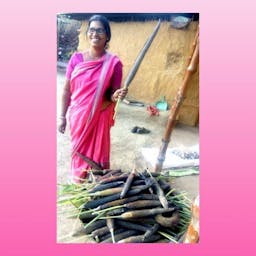Cruelty of Development
Jan 21, 2015
Story
There was a bonded labour who worked for his maternal uncle who was a Zamindar (big landlord) in the village. This was before the village was submerged by the construction of a dam on a big river nearby. The labourer’s subsistence needs were taken care of by his uncle and the landlord also bore the cost of marrying him to a girl and gave him a small piece of land to provide for his married life. The labourer had left his home in his childhood after both his parents died and his brothers did not look after him and instead he went to work in his maternal uncle’s house. He had no other option to go anywhere else. He worked from childhood to the age of fifty. He didn’t demand anymore from his uncle, as he got shelter to grow up safely under him. The landlord treated him as a bonded labourer and not as a nephew or as a human being but he always followed his uncle’s order.
Later the village was submerged in the dam and the man had to leave and come back to his own village and small portion of land and begin work there independently. The man was aware about the importance of education and so he sent his sons and daughters to school. His eldest son didn’t want to study so he also worked with his father on the landlord’s farm. One elder daughter had been given in marriage but the rest of the children were in the school. One boy was good in his studies, so he was sent to the government hostel in a nearby town. He passed his 11th standard and got a job as a forest guard in the forest department. The labourer had many expectations from his son that he would help the whole family to lead their life with dignity. He had hoped that his son would support all the family members, especially the younger brothers and sisters. The labourer was innocent and did not know that his son had grown up with other ideas. His son observed the urban life which was self centred. There the people help only themselves and not others. The culture of individualistic life styles in the city affects all the people who live there. The town educated son also could not keep himself aloof from his surroundings. He was lucky to get a Government job at that time, as later none of his younger brothers and sisters could get a job. The Government cut down on the number of people it was employing and a larger number from the earlier uneducated population was getting educated and so the competition increased. The so called development work going on in the country resulted in the dam being constructed and the labourer family being displaced. The people were unaware as to why the Government was displacing them. Simply they wanted to lead their lives peacefully. The landlord, who made the labourer bonded for life despite him being his nephew, did not register a single protest with the Government to save his own lands. All the people were uncertain about their future. They had got very little money as compensation for their land, houses and trees. The labourer got only three thousand rupees for his house and trees. His uncle had gifted him a piece of land but did not legally transfer the ownership of that land. The man was very happy to see his son in a government job. He told his wife that he wants to get his working son married into a good family. The money which was provided by the Government for their rehabilitation would have to be spent for that. His wife and all the family members did not agree. His eldest son opposed this decision till the last moment of the marriage ceremony. The man was very confident that he would get all types of help from his son to take care of all family members. The forest guard son was, however, interested only to settle his own life. He was not much concerned about his parents and he cleverly deceived them and established himself as a middle class man. He ignored his father’s requests for support and did not fulfil his father’s expectation. He used to rarely come home. The man died a disillusioned person gravely saddened by his son’s selfishness.
The man had parental property of five acres of land in his old village but he had no bullock for farming. He used to give his land on rent to others at a cheap price and used that money and wages from labouring on others’ farms to run his family. He had not enough money to properly establish his family in a new place. After a few years his wife died and he suffered a lot as there was no one there to condole with him. He survived to the age of seventy but he had no rest from labour work as only when he earned could he eat as otherwise there was no food. The man died without any care despite having six children, three sons and three daughters. Thus, for poor people in this society there is no support structure and the culture of selfishness that pervades urban society corrupts the people who succeed in making a place for themselves in it and turns them away from their families. This is the cruel nature of modern development and culture in India that oppresses the poor even more than in colonial times.




